
por/by Jean-François Brient
del Sitio Web/from Website
DeLaServitud

|

traducción
por Alfonso Echeverry |
|

translation by Ariana Vallecilla & Carolina Cajiao |
|
|
Capítulo I: Epígrafe
“Mi optimismo está basado en la certeza de que esta civilización está por
derrumbarse. Mi pesimismo, en todo lo que hace por arrastrarnos en su caída.”
|
|
Chapter I: Epigraph
“My optimism is based on the certainty that this civilization is about to
collapse. My pessimism lies on the things that are dragging us down in its
fall”
|
|
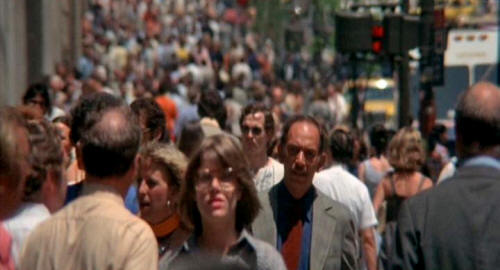
|
Capítulo II: La servidumbre voluntaria
“Es el mal de estos tiempos, los locos guían a los ciegos.”
William Shakespeare
La servidumbre moderna es una esclavitud voluntaria, consentida por la
muchedumbre de esclavos que se arrastran por la faz de la tierra. Ellos
mismos compran las mercancías que los esclavizan cada vez más. Ellos mismos
procuran un trabajo cada vez más alienante que se les otorga si demuestran
estar suficientemente amansados. Ellos mismos eligen los amos a quienes
deberán servir.
Para que esta tragedia absurda pueda tener lugar, ha sido
necesario despojar a esa clase de la conciencia de su explotación y de su
alienación. He ahí la extraña modernidad de nuestra época. Al igual que los
esclavos de la antigüedad, que los siervos de la Edad Media y que los
obreros de las primeras revoluciones industriales, estamos hoy en día frente
a una clase totalmente esclavizada, solo que no lo sabe o más bien, no lo
quiere saber.
Ellos ignoran la rebelión, que debería ser la única reacción
legitima de los explotados. Aceptan sin discutir la vida lamentable que se
planeó para ellos. La renuncia y la resignación son la fuente de su
desgracia.
He ahí la pesadilla de los esclavos modernos que no aspiran sino a ser
llevados por la danza macabra del sistema de la alienación.
La opresión se moderniza expandiendo por todas partes las formas de
mistificación que permiten ocultar nuestra condición de esclavos.
Mostrar la realidad tal como es y no tal como la presenta el poder, constituye la subversión más genuina.
Sólo la verdad es revolucionaria.
|
|
Chapter II: Voluntary servitude
“Tis the times' plague, when madmen lead the blind. “
William Shakespeare
Modern servitude is voluntary, consented to by the mass of slaves who trudge
along the face of the Earth. They themselves buy the commodities that
enslave them every day more. Slaves procure alienating jobs that are
bestowed upon the tamed. They, themselves, choose the masters whom they will
obey.
For this absurd tragedy to play-out, it has been necessary to breed in
them the ignorance of their own exploitation and alienation. Behold the
bizarre modernity of our time. As with the slaves of antiquity, serfs of the
Middle Ages or the working-class of the first industrial revolutions, today
we bear witness to an emerging class of the totally enslaved. The difference
being that they don’t know it or better yet choose to ignore it.
They fail
to recognize the one weapon available to the enslaved: rebellion. Slaves
accept without question the pitiful life that was manufactured on their
behalf. Apathy and resignation are the sources of their misfortune.
Behold the nightmare of the modern-day slave; whose sole aspiration is to be
swept away by the macabre dance of the machine of alienation.
Oppression becomes modern spreading out everywhere mystifications that hide
our slave condition.
Reveal reality as it is and not as power represents it, is indeed the most
genuine subversion.
Only truth is revolutionary.
|
|
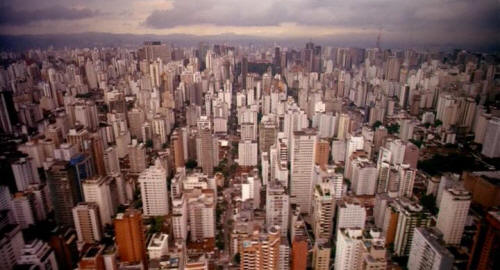
|
Capítulo III: La planeación territorial y la vivienda
“El urbanismo es esta toma de posesión del medio ambiente natural y humano
por el capitalismo que, desarrollándose lógicamente como dominación absoluta,
puede y debe ahora rehacer la totalidad del espacio como su propio decorado.”
Guy Debord
La Sociedad del Espectaculo.
A medida que construyen su mundo con la fuerza alienada de su trabajo, el
decorado de este mundo se vuelve la cárcel donde tendrán que vivir. Un mundo
sórdido, sin sabor ni olor, que lleva en sí la miseria del modo de
producción dominante.
Este decorado está en permanente construcción, nada en él es constante. La
remodelación continua del espacio que nos rodea está justificada por la
amnesia generalizada y la inseguridad con las que tienen que vivir sus
habitantes. Se trata de cambiarlo todo a la imagen del sistema: el mundo se
vuelve como una fábrica, cada vez más sucio y ruidoso.
Cada parcela de este mundo es propiedad de un Estado o de un particular.
Este robo social que es la apropiación exclusiva de la tierra se materializa
en la omnipresencia de los muros, de las rejas, de las cercas, de las
barreras y de las fronteras. Son las marcas visibles de esa separación que
lo invade todo.
Pero al mismo tiempo, la unificación del espacio, según los intereses de la
cultura mercantil, es el gran objetivo de nuestra triste época. El mundo
debe convertirse en una inmensa autopista, absolutamente eficiente, para
facilitar el transporte de las mercancías. Todo obstáculo, natural o humano,
debe ser destruido.
La concentración inhumana de esa masa de esclavos es fiel reflejo de su vida:
se asemeja a las jaulas, a las cárceles, a las cavernas. Pero a diferencia
del esclavo o del prisionero, el explotado de la época moderna debe pagar
por su jaula.
“Pues no es el hombre sino el mundo el que se ha vuelto anormal.”
Antonin Artaud
|
|
Chapter III: Town planning and housing
“Urbanism — “city planning” — is capitalism’s method for taking over the
natural and human environment. Following its logical development toward
total domination, capitalism now can and must refashion the totality of
space into its own particular decor.”
Guy Debord
Society of the Spectacle.
As slaves build their world with the alienated strength of their work, the
worlds decor becomes the jail they will be forced to inhabit; a squalid
world lacking taste and scent, a host to the misery inherent in the dominant
mode of production.
This decor is in a state of perpetual construction, nothing in it is
constant. The ceaseless redesign of the space that surrounds us is justified
by the generalized amnesia and insecurity that its inhabitants must live
with. The systems objective is to fashion everything in its image: every day
the world becomes dirtier and noisier, like a factory.
Every inch of land in this world belongs to a State or to an individual.
This social theft through the acquisition of lands is manifest by the
omnipresence of walls, fences, barriers and frontiers. These are the visible
marks of the divide that invades everything.
The unification of space for commercial ends, however, is the grand
objective of our sad age. The world must become an immense and efficient
highway in order to facilitate the transport of merchandise. Every obstacle,
human or natural, must be destroyed.
The inhumane concentration of modern day slaves into reduced crowded spaces
reflects their lives and evokes cages, jails, and caves. But in contrast to
slaves or prisoners, the modern day slave pays for his own cage.
“Because it is not the man but the world which has become abnormal.”
Antonin Artaud
|
|

|
Capítulo IV: La mercancía
“A primera vista, una mercancía parece ser una cosa trivial, de comprensión
inmediata. Su análisis demuestra que es un objeto endemoniado, rico en
sutilezas metafísicas y reticencias teológicas.”
Carlos Marx
El Capital, capítulo I, libro 4.
En este estrecho y lúgubre espacio en donde vive, el esclavo acumula las
mercancías, que según los mensajes publicitarios omnipresentes, deberán
traerle la felicidad y la plenitud.
Pero entre más acumula mercancías, más
se aleja de él la posibilidad de acceder un día a la felicidad.
“De qué le sirve al hombre poseerlo todo, si a cambio pierde su alma.”
El Evangelio según San Marcos 8, 36
La mercancía, ideológica por esencia, despoja de su trabajo al que la
produce y despoja de su vida al que la consume. En el sistema económico
dominante, ya no es la demanda la que condiciona la oferta, sino la oferta
la que determina la demanda.
Es así como, de manera periódica, surgen nuevas
necesidades consideradas vitales por la inmensa mayoría de la población:
primero fue el radio, luego el carro, el televisor, el computador y ahora el
celular.
Todas estas mercancías, distribuidas masivamente en un corto lapso de tiempo,
modifican en profundidad las relaciones humanas: sirven por un lado para
aislar a los hombres un poco más de sus semejantes y por otro, para difundir
los mensajes dominantes del sistema:
“Las cosas que poseemos terminan por
poseernos.”
|
|
Chapter IV: Commodities
“A commodity appears, at first sight, a very trivial thing, and easily
understood. Its analysis shows that it is, in reality, a very queer thing,
abounding in metaphysical subtleties and theological niceties.”
Karl Marx
The Capital, chapter 1, book 4.
In this narrow and mournful place they inhabit, slaves accumulate the
commodities that according to the omnipresent advertising guarantee
happiness and fulfillment.
Alas, the more commodities they accumulate the
more elusive happiness becomes.
"For what will it profit a man if he gains the whole world, and loses his own
soul?"
Mark 8:36
Commodities, ideological by nature, estrange from his work he who produces
them and divorce from his life he who consumes them. In the dominant
economic system, demand no longer drives supply; it is supply, which
determines demand.
New needs are periodically manufactured and hence
considered essential by most people: it began with the radio, then the
automobile, later the television set, the computer and now the cell phone.
All these commodities, massively distributed in a brief period of time,
profoundly alter human relationships: they serve to isolate human beings
from their fellow creatures while at the same time they propagate the
dominant messages of the system:
“Everything we possess will in turn possess
us”
|
|
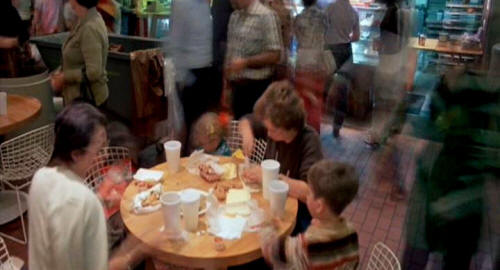
|
Capitulo V: La alimentación
“Lo que es comida para unos, es veneno para otros.”
Paracelso
Pero es cuando se alimenta que el esclavo moderno ilustra mejor el estado de
decadencia en que se encuentra. Disponiendo cada vez de menos tiempo para
preparar la comida que ingiere, se ve reducido a consumir a la carrera lo
que
la industria agroquímica produce. Erra por los supermercados en busca de
los sucedáneos que la sociedad de la falsa abundancia consiente en darle.
Su
elección no es más que una ilusión. La abundancia de los productos
alimentarios no disimula sino su degradación y su falsificación. No son otra
cosa que organismos genéticamente modificados, una mezcla de colorantes y
conservantes, de pesticidas, de hormonas y de otros tantos inventos de la
modernidad.
El placer inmediato es la regla del modo de alimentación
dominante, así como la de todas las formas de consumo. Y las consecuencias
que ilustran esta manera de alimentarse se ven por todas partes.
Pero es frente a la indigencia de la mayoría que el hombre occidental se
regocija de su posición y de su consumo frenético. Por tanto, la miseria
está dondequiera que reine la sociedad mercantil totalitaria.
La escasez es
el revés de la moneda de la falsa abundancia. Aunque la producción
agroquímica es suficiente para alimentar a la totalidad de la población, en
un sistema que hace de la desigualdad un criterio de progreso, el hambre no
deberá desaparecer jamás.
“Ellos están convencidos de que el hombre, especie pecadora por excelencia,
domina la creación. Como si todas las demás criaturas no hubieran sido
creadas sino para servirles de comida, de pieles, para ser martirizadas y
exterminadas.”
Isaac Bashevis Singer
La otra consecuencia de la falsa abundancia alimentaria es la multiplicación
de las fábricas de concentración y el exterminio bárbaro y a gran escala de
las especies que sirven para alimentar a los esclavos. Esta es la esencia
misma del modo de producción dominante.
La vida y la humanidad no resisten
más ante el afán de lucro
de unos cuantos. |
|
Chapter V: Nourishment
"Poison for some; food for others"
Paracelsus
It is in the manner in which the modern slave feeds himself that better
illustrates his degree of decay. With little time to spare for the
preparation of his sustenance, he is reduced to consuming quick meals
produced by
the agrochemical industry. He wanders through supermarkets
looking for the ersatz that the society of false abundance offers.
Once
again, his choice is nothing but illusion. The abundance of food as a
commodity is evidence of its degradation and falsification. It is nothing
more than genetically modified organisms, a mix of colorants and
preservatives, of pesticides, hormones and other inventions of modernity.
Immediate gratification is the motivation behind how a slave chooses to feed
himself, this is the motivating factor for all forms of consumption. The
consequences are everywhere evident.
However, it is when faced with the indigence of the majorities that the
westerner can rejoice in his position of privilege and frenetic consumption.
As a consequence, Misery is ubiquitous in a totalitarian mercantile society.
Scarcity is the other face of the false abundance coin. Despite the ample
supply produced by the agrochemical industry, in a system where inequality
means progress, hunger must not disappear, ever.
“They have convinced themselves that man, the worst transgressor of all
species, is the crown of creation. All other creatures were created merely
to provide him with food, pelts, to be tormented, exterminated.”
Isaac Bashevis Singer
The other consequence of the alleged food abundance is the multiplication of
“concentration” factories and the massive and barbarous extermination of
species for the sustenance of the enslaved. That is the essence of the
dominant mode of production.
Life and humankind cannot withstand the thirst
for profit
of a few. |
|

|
Capítulo VI: La destrucción del medio ambiente
“Qué triste es pensar que la naturaleza habla y que el género humano no la
escucha.”
Victor Hugo
El pillaje de los recursos del planeta, la abundante producción de energía o
de mercancías, los residuos y los desechos del consumo ostentoso hipotecan
las posibilidades de supervivencia de nuestra tierra y de las especies que
la pueblan. Pero para darle paso al capitalismo salvaje, el crecimiento no
deberá parar jamás. Hay que producir, producir y volver a producir cada vez
más.
Y son los mismos que contaminan quienes se presentan hoy en día como los
salvadores del planeta. Esos imbéciles de la industria del espectáculo,
patrocinados por las firmas multinacionales, intentan convencernos de que un
simple cambio en nuestros hábitos bastará para salvar al planeta del
desastre.
Y mientras que nos culpan, continúan contaminando sin cesar el
medio ambiente y nuestro espíritu. Esas pobres tesis seudo-ecológicas son
repetidas por todos los políticos corruptos que necesitan eslóganes
publicitarios.
Pero se cuidan bien de no proponer un cambio radical en el
sistema de producción. Se trata, como siempre, de cambiar algunos detalles
para que lo esencial siga siendo igual. |
|
Chapter VI: destruction of the environment
“It is a sad thing to consider nature talks and human kind does not listen.
"
Victor Hugo
The pillage of the planets resources, the massive production of energy or
commodities, the waste products of the ostentatious consumption, jeopardize
the possibilities of survival for our planet and the species which inhabit
it. However, in order to give way to brutal capitalism, the growth must
continue. Produce, produce and keep producing.
Those who contaminate are today misrepresenting themselves as the saviors of
the planet. Those show business buffoons, sponsored by multinationals firms,
try to convince us that a simple change in our habits will be enough to save
the planet from disaster.
And while they blame us, they keep on
contaminating the environment and our souls. Those poor pseudo ecological
views are repeated by corrupt politicians in need of advertising slogans.
Those in charge take pains to avoid making significant change in the
production system and as always, change is half hearted and superficial,
things remain as they are and have always been. |
|
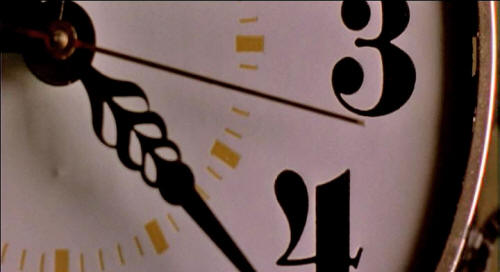
|
Capítulo VII: El trabajo
“Trabajo, del latín tri palium
'tres palos', instrumento de tortura.”
Para entrar en la ronda del consumo frenético, hay que tener dinero y para
tenerlo, hay que trabajar, es decir, venderse. El sistema dominante ha hecho
del trabajo su principal valor, y los esclavos deben trabajar cada vez más
para pagar a crédito su vida miserable.
Se agotan en el trabajo, pierden con
él la mayor parte de su fuerza vital y tienen que soportar las peores
humillaciones. Pasan toda su vida haciendo una actividad extenuante y
molesta para el beneficio de unos cuantos.
La invención del desempleo
moderno tiene como propósito asustarlos y hacerles agradecer sin cesar la
generosidad del poder.
¿Qué harían sin esta tortura que es el trabajo? Son estas actividades
alienantes las que nos presentan como una liberación. ¡Qué mezquindad y qué
desdicha!
Siempre apresurado por el cronómetro o el látigo, cada gesto de los esclavos
está calculado a fin de aumentar la productividad. La organización
científica del trabajo constituye la esencia misma de la desposesión de los
trabajadores, del fruto de su trabajo y del tiempo que pasan en la
producción automática de las mercancías o de los servicios.
La actividad del
trabajador se confunde con el de una máquina en las fábricas, o con el de un
computador en las oficinas. El tiempo pagado no se recupera jamás.
De esta manera, a cada empleado se le asigna un trabajo repetitivo, ya sea
intelectual o físico. Él es un especialista en su área de producción. Esta
especialización se reproduce a escala planetaria en el marco de la división
internacional del trabajo.
Se concibe en Occidente, se produce en Asía, se
muere en África. |
|
Chapter VII: Work
Work (travail in French), from Latin
'tri palium'-'three sticks', “torture
instrument”
To participate in the round of frenetic consumption, one must have means and
one must, therefore, work, in other words, one must sell oneself. The
dominant system champions work as its most esteemed value; slaves have to
work more to buy on credit their miserable lives.
Slaves wear out in the
work place; they waste their vital strength and have to suffer the worst
humiliations. They spend their lives performing grueling tasks for the
benefit of a few.
Modern unemployment is invented as a scare tactic to force
slaves into endless gratitude the generosity of the power elite.
What would they do if they didn’t have to suffer this torture called work?
These Alienating activities are touted as freeing. What degradation and what
misfortune!
Always pressured on by the time clock or the whip; every movement of the
slave is designed to increase productivity. The scientific organization of
labor is at the heart of the workers divestment from himself, the fruit of
his labor and his time - which is misspent in the automated production of
commodities or services. The workers labor is mistaken for that of the
machine in the factories, or the computer in the office. Paid time will
never be recovered.
Every worker is assigned a repetitive duty, be it physical or intellectual.
The worker is a specialist in his own field. This specialization can be seen
on a worldwide scale within the framework of the international division of
labor.
Conceived in the West, produced in Asia and lethal in Africa. |
|
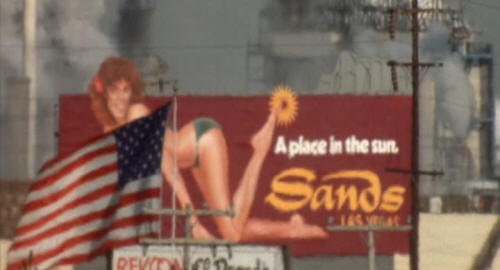
|
Capítulo VIII: Colonización de todos los sectores de la vida
“El hombre entero está condicionado al comportamiento productivo por la
organización del trabajo, y fuera de la fábrica, mantiene la misma piel y la
misma cabeza.”
Christophe Dejours
A medida que el sistema de producción coloniza todos los sectores de la vida,
el esclavo moderno, no conforme con su servidumbre en el trabajo, sigue
desperdiciando su tiempo en las actividades de esparcimiento y las
vacaciones planificadas. Ningún momento de su vida escapa al dominio del
sistema.
Cada instante de su vida ha sido invadido.
Es un esclavo de tiempo
completo. |
|
Chapter VIII: The colonization of every sector of life
“Men is conditioned to have a productive behavior by the work organization;
and outside the factory, he preserves the same skin and the same head”
Christophe Dejours
To the extent that the system of production colonizes every sector of life,
the modern slave wastes his free time in leisure activities and planned
holidays. No part of his life escapes the reach of the system.
Every moment
of his life has been invaded. He is a full time slave. |
|
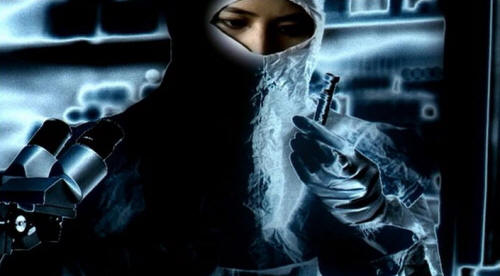
|
Capítulo IX: la medicina mercantil
“La medicina hace morir más lentamente.”
Plutarco
La degradación generalizada de su medio ambiente, del aire que respira, y de
la comida que consume; el stress de sus condiciones laborales y de la
totalidad de su vida social son el origen de las nuevas enfermedades del
esclavo moderno.
Su condición servil es una enfermedad para la cual no
existirá jamás ninguna medicina. Sólo la completa liberación de la condición
en la que se encuentra, puede permitirle al esclavo moderno reponerse de su
sufrimiento.
La medicina occidental no conoce sino un remedio contra los males que sufren
los esclavos modernos: la mutilación. Es a base de cirugías, de antibióticos
o de quimioterapia que se trata a los pacientes de
la medicina mercantil.
Nunca se ataca el origen del mal sino sus consecuencias, porque la búsqueda
de las causas nos conduciría inevitablemente a la condenación implacable de
la organización social en su totalidad.
Así como el sistema actual ha convertido cada elemento de nuestro mundo en
una simple mercancía, también ha hecho de nuestro cuerpo una mercancía, un
objeto de estudio y experimentación para los seudo-sabios de la medicina
mercantil y de la biología molecular.
Los amos del mundo ya están a punto de
patentar todo lo viviente. La secuencia completa del
ADN del genoma humano
es el punto de partida de una nueva estrategia puesta en marcha por el poder.
La decodificación genética no tiene otra finalidad que la de ampliar
considerablemente las formas de dominación y de control.
Como tantas otras cosas, nuestro cuerpo ya no nos pertenece. |
|
Chapter IX: Mercantile medicine
“Medicine makes you die slowly”
Plutarch
The generalized degradation of his environment, of the air he breaths, of
the food that he consumes; the stress of his working environment, his entire
social condition are the origins of the new diseases befalling the modern
slave.
His servile standing is an ill for which there will never be a cure.
Only the complete emancipation from his present condition would allow the
modern slave to recover from his suffering.
Western medicine knows only one way to cure the maladies of modern-day
slaves: mutilation. Under
commercialized medicine, patients are subjected to
surgeries, antibiotics or chemotherapy.
The origins of pain are never
considered, only its consequences, such a search would inevitably lead to a
condemnation of the social structure in its totality.
Just as the current system reduces everything in our world to mere
commodities, so does it transform our bodies into such; into the object of
study and experimentation of the pseudo-wise men of commercial medicine and
molecular biology.
The masters of the world are set to patent every living
thing. The complete sequencing of the
DNA of the human genome is the point
of departure of a new strategy decided on power. Genetic decoding serves no
purpose but to considerably expand domination and control.
As with many other things, our bodies no longer belong to us. |
|
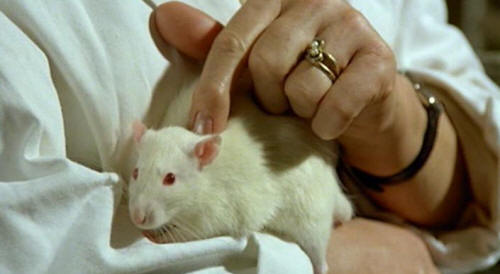
|
Capitulo X: la obediencia como segunda naturaleza
“A fuerza de obedecer se obtienen reflejos de sumisión.”
Anónimo
Lo mejor de su vida se le escurre por los dedos, pero él continúa porque
tiene la costumbre de obedecer desde siempre. La obediencia se ha convertido
en su segunda naturaleza. Obedece sin saber por qué, simplemente porque sabe
que tiene que obedecer.
Obedecer, producir y consumir, he ahí el tríptico
que domina su vida. Obedece a sus padres, a sus profesores y a sus patrones,
a sus propietarios y a sus mercaderes.
Obedece a la ley y a las fuerzas del
orden, obedece a todos los poderes porque no sabe hacer otra cosa. No hay
nada que lo asuste más que la desobediencia, porque la desobediencia es el
riesgo, la aventura, el cambio. Así como el niño entra en pánico apenas
pierde de vista a sus padres, el esclavo moderno se siente desorientado sin
el poder que lo ha creado.
Por eso, continúa obedeciendo.
El miedo ha hecho de nosotros unos esclavos y nos mantiene en esa condición.
Nos inclinamos ante los amos del mundo; aceptamos esta vida de humillaciones
y de miseria, solamente por temor.
Sin embargo, nosotros disponemos de la fuerza numérica frente a la minoría
que gobierna. Su fuerza no la obtienen de su policía sino de nuestro
consentimiento. Justificamos nuestra cobardía al enfrentamiento legítimo
contra las fuerzas que nos oprimen con un discurso lleno de humanismo
moralizador.
El rechazo a la violencia revolucionaria está anclado en los
espíritus de aquellos que se oponen al sistema defendiendo unos valores que
el mismo sistema les ha enseñado.
Pero cuando se trata de conservar su hegemonía, el poder no vacila nunca en
utilizar la violencia. |
|
Chapter X: Obedience as a second nature
“Through obedience one develops the reflex of submission”
Anonymous
The best part of the slaves life slips through his fingers, but he continues
because he has always obeyed. Obedience has become second nature to him. He
obeys not knowing why, simply that he must.
Obey, produce and consume,
behold the triptych that rules his life. He obeys his parents, his teachers
and his masters, the landlords and the merchants.
He obeys the forces of law
and order; he obeys all powers because he does not know any better. There is
nothing that frightens him more than disobedience, because it signifies
risk, adventure, change. Just As a child panics when he loses sight of his
parents, the modern slave feels lost without the power system that has
created him.
Therefore, his obedience continues..
Fear has made us slaves and it keeps us in that condition. We bow before the
masters of the world; we accept this life of humiliations and misery,
strictly out of fear.
Nevertheless, we count on greater numbers as compared the ruling class..
Their strength does not come from the police, it comes from our consent. We
justify our cowardice to the forces that oppress us with a discourse full of
moralizing humanism.
The rejection of revolutionary violence is anchored in
the spirit of those who oppose the system while defending the values it
teaches. .
But when power must defend its hegemony it never hesitates in using
violence. |
|
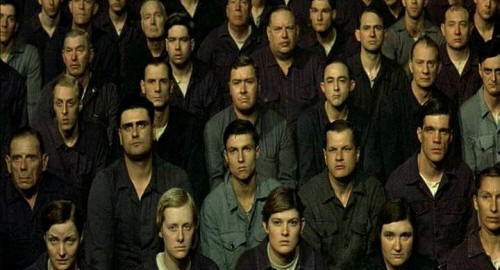
|
Capitulo XI: represión y vigilancia
“Bajo un gobierno que aprisiona injustamente, el lugar del hombre justo es
también en prisión.”
Henry David Thoreau
La Desobediencia Civil.
Sin embargo, existen algunos individuos que escapan al control de las
conciencias, pero están bajo vigilancia. Todo acto de rebelión o de
resistencia es asimilado como una actividad desviada o terrorista.
La
libertad no existe sino para aquellos que defienden los imperativos
mercantiles. A partir de ahora, la verdadera oposición al sistema dominante
es totalmente clandestina. Contra esos opositores, la represión es la regla
vigente.
Y el silencio de la mayoría de los esclavos frente a esta represión
es justificada por el propósito mediático y político de negar el conflicto
que existe en la sociedad real. |
|
Chapter XI: Repression and supervision
“Under a government, which imprisons unjustly, the true place for a just man
is also a prison.”
Henry David Thoreau
Civil Disobedience
Nonetheless, there are individuals who escape mental control, but they are
under surveillance. Every uprising or act of resistance is considered
deviant behavior or an act of terrorism.
Freedom is reserved for those who
defend the commercial interests. Henceforth, the real opposition to the
dominant system is totally clandestine. For its retractors, repression is
the law.
The silence of the majority of slaves facing this repression is the
result of a political and media campaign that denies the existence of this
real conflict. |
|
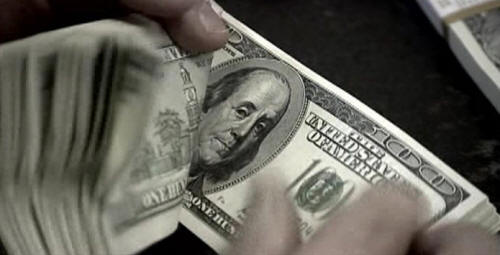
|
Capítulo XII: El dinero
“Y aquello que hicimos antes por el amor de
Dios, lo hacemos ahora por el
amor al dinero, es decir, por amor a aquello que da la sensación más elevada
de poder y la buena conciencia.”
Nietzsche
Aurora
Como todos los seres oprimidos de la historia, el esclavo moderno necesita
de su mística y de su dios para anestesiar el mal que le atormenta y el
sufrimiento que le agobia.
Pero
este nuevo dios, a quien entregó su alma, no
es más que la nada. Un trozo de papel, un número que tiene sentido solo
porque todos han decidido dárselo. Es por este nuevo dios que estudia,
trabaja, riñe y se vende.
Es por este nuevo dios que ha abandonado sus
valores y está dispuesto a hacer lo que sea. Él cree que entre más plata
posea más se librará de la coacción que lo sujeta. Como si la posesión fuera
de la mano de la libertad.
La liberación es una ascesis que proviene del
dominio de sí mismo; un deseo y una voluntad de actuar. Está en el ser y no
en el tener. Pero hay que decidirse a no servir ni obedecer más.
Falta ser
capaz de romper con unos hábitos que nadie, al parecer, osa poner en tela de
juicio. |
|
Chapter XII: Money
“What we did before for the love of
God, nowadays we do it for the love of
money, which means, for the love of what gives us the sensation of highest
power and good conscience”
Aurora, Nietzsche
As with all oppressed human beings throughout history, the modern slave
needs mysticism and god to anaesthetize the evil that torments him and the
suffering that overwhelms him.
But
this new god to whom he gave his soul is
naught but nothingness: a piece of paper, a number that, through his common
consent, acquires artificial value. It is in the name of this god that
people work, study, fight, and sell themselves.
It is for this
god that man
forsakes his values and is prepared to do whatever. He believes that the
more money he possesses the more free he will be from all constraints, as
though ownership and freedom went hand in hand.
Freedom is the asceticism
that comes from self-control, from the desire and will to act. To be, not,
to have. One must resolve to never serve and obey under any condition.
But
to be free, it is necessary to break with habits that no one, it seems, dare
challenge. |
|

|
Capitulo XIII: No hay alternativa a la organización social dominante
Acta est fabula
El juego terminó
Ahora bien, el esclavo moderno está convencido de que no existe alternativa
a la organización del mundo presente. Se ha resignado a esta vida porque
piensa que no puede haber otra. Es ahí en donde reside la fuerza de la
dominación presente: hacer creer que este sistema que ha colonizado toda la
superficie de la Tierra es el fin de la historia.
Ha convencido a la clase
dominada que adaptarse a su ideología equivale a adaptarse al mundo tal como
es y tal como ha sido siempre. Soñar con otro mundo se ha convertido en un
crimen condenado al unísono por los medios y por todos los poderes. El
criminal es en realidad aquel que contribuye, consciente o no, a la demencia
de la organización social dominante.
No hay locura más grande que la del
sistema presente. |
|
Chapter XIII: There is no alternative to the dominant social organization
Acta est fabula
The play is done
Today’s slave is convinced that there is no alternative to the existing
world order. He has resigned himself to this life because he believes there
is no other. Herein lies the force of the present domination; maintain the
illusion that this system, which has colonized the entire world, is the end
of History.
It has convinced the subjugated class that this ideology is
mankind’s true state of nature, and as such his logical condition. To dream
of a different world has become a crime condemned in unison by the media and
all the entities of power. When in reality, the criminal, is he who
contributes, consciously or not to the dementia of the dominant social
structure.
There is no greater madness than that of the present system. |
|
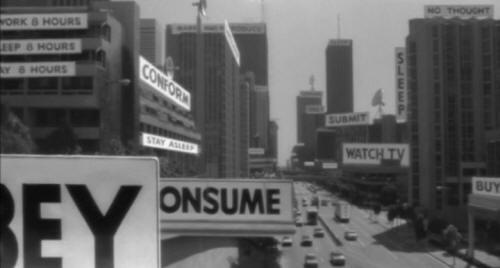
|
Capítulo XIV: La imagen
“Pero, sabed, oh rey, que no adoraremos a tus dioses ni nos arrodillaremos
ante la imagen de oro.”
Antiguo Testamento, Daniel 3 :18
Ante la devastación del mundo real, es necesario para el sistema colonizar
la conciencia de los esclavos. Es por eso que el sistema dominante ha
decidido enfocarse en la disuasión que, desde la más pequeña edad, cumple el
papel preponderante en
la formación de los esclavos.
Ellos deben olvidar su
condición servil, su prisión y su vida miserable. Basta con ver esa
muchedumbre hipnótica, conectada a las pantallas que acompañan su vida
cotidiana. Ellos disfrazan su insatisfacción permanente con el reflejo
manipulado de una vida soñada, hecha de dinero, de gloria y de aventura.
Pero sus sueños son tan lamentables como su vida miserable.
Hay imágenes para todo y para todos. Esas imágenes llevan en sí el mensaje
ideológico de la sociedad moderna y sirven de instrumento de unificación y
de propaganda. Se multiplican a medida que el hombre es despojado de su
mundo y de su vida. Es el niño el primer blanco de esas imágenes. Hay que
volverlos estúpidos y extirparles toda forma de reflexión y de crítica.
Todo
ello se hace, claro está, con la desconcertante complicidad de sus padres,
quienes han desistido ante el impacto de los medios modernos de comunicación.
Ellos mismos compran todas las mercancías necesarias para la esclavización
de su progenie. Se desentienden de la educación de sus hijos y se la dejan
al sistema del embrutecimiento y de la mediocridad.
Hay imágenes para todas las edades y para todas las clases sociales. Los
esclavos modernos confunden esas imágenes con la cultura y, a veces, con el
arte. Se recurre constantemente a los instintos más bajos para vender
cualquier mercancía. Y es la mujer, doblemente esclava en la sociedad
presente, la que paga el precio más alto.
Ella es presentada como simple objeto de consumo. La rebelión ha sido
también reducida a una imagen desprovista de su potencial subversivo. La
imagen sigue siendo la forma de comunicación más directa y más eficaz: crea
modelos, embrutece a las masas, les miente, les infunde frustraciones y les
insufla la ideología mercantil.
Se trata, pues, una vez más y como siempre,
del mismo objetivo:
vender, modelos de vida o productos, comportamientos o
mercancías, vender no importa qué, pero vender.
|
|
Chapter XIV: Image
“But if not, let it be known to you, o king, that we do not serve gods, nor
will we worship the gold image which you have set up”.
Daniel 3 :18
In light of the world’s devastation, the system needs to conquer the slaves’
conscience. At an early age, repression takes the form of dissuasion and is
used in the formation of slaves. It is for this reason the system has
focused, at an early age, on dissuasion as the predominant lesson in
the
slaves’ miseducation.
They must forget their servile condition, their
prisons and their miserable lives. The sight of hypnotized masses, connected
to the screens that accompany their daily lives is proof enough. They
disguise their permanent dissatisfaction with the distorted image of a dream
life, made of money, glory and adventure. But their dreams are as deplorable
as their miserable life.
There are images for everything and for everybody. Those images constitute
the ideological message of modern society and serve as means of unification
and propaganda. As mankind is stripped from his world and his life these
images multiply. Children are the first target of these images. They must be
made stupid, bereft of any reflective and critical thinking.
All this is
done with the disconcerting complicity of their parents, who have
surrendered to the modern communication apparatus. They themselves buy the
commodities that enslave their offspring. They abdicate their role in their
children’s education and entrust it to a mediocre and stultifying system.
There are images for all ages and for all social classes. Modern slaves
mistake those images for culture, and at times, for art. The market relies
on the basest impulses to sell any commodity. It is women, doubly enslaved
in today’s society, who pay dearest. In it, she is reduced to being a mere
object of consumption.
The image of uprising has also been divested of its
subversive potential. The image is today the simplest and most effective
form of communication. It creates role models, it stultifies the masses, it
lies to them, and it breeds frustrations in them. The mercantile ideology is
disseminated repeatedly through the use of the Image.
Its objective is
always the same:
to sell; be it ways of life or products, behaviors or
commodities, no matter what, sell.
|
|
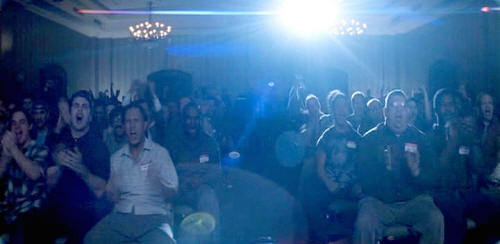
|
Capitulo XV: El entretenimiento
“La televisión embrutece a los que la miran, no a los que la hacen.”
Patrick Poivre d’Arvor
Esos
pobres esclavos se divierten, pero ese divertimiento no sirve más que
para distraerlos del auténtico mal que los acosa. Han dejado que hicieran de
su vida cualquier cosa y fingen sentirse orgullosos de ello.
Intentan lucir
satisfechos pero nadie les cree; ni ante al frío reflejo del espejo,
alcanzan a engañarse. Pierden su tiempo delante de unos imbéciles que los
hacen reír o cantar, soñar o llorar.
A través del deporte mediático, se representa el éxito y el fracaso, el
esfuerzo y las victorias que el esclavo moderno ha dejado de vivir en carne
propia. Su insatisfacción lo incita a vivir por encargo frente a su aparato
de televisión.
Mientras que los emperadores de la Antigua Roma compraban la
sumisión del pueblo con pan y circo, hoy en día, es con divertimientos y
consumo del vacío que se compra el silencio de los esclavos. |
|
Chapter XV: Entertainment
These
unfortunate slaves entertain themselves, but the entertainment serves
only to distract them from the ills that plague them. Slaves have left their
lives in the hands of others to do whatever they will and pretend to take
pride in it.
They affect satisfaction, but nobody believes it, even before
the cold reflection of the mirror, they fail to fool themselves. They pilfer
their time watching idiots who make them laugh or sing, dream or cry.
The sports media, becomes a channel through which slaves feel the success,
failure, effort and victory, they no longer experience in the flesh.
They
live by proxy in front of the television set. While the Emperors of Ancient
Rome lulled their people into submission with the promise of “bread and
games”, today's acquiescence is procured through entertainment and the
consumption of emptiness. |
|
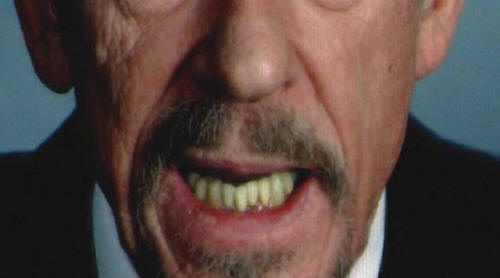
click
imagen arriba/click above image
|
Capitulo XVI: El lenguaje
“Uno cree que domina las palabras, pero son las palabras las que lo dominan
a uno.”
Alain Rey
El control de las conciencias es el resultado de la utilización viciada del
lenguaje por la clase económica y socialmente dominante. Siendo el dueño de
todos los medios de comunicación, el poder difunde la ideología mercantil a
través de la definición fija, parcial y amañada que le atribuye a las
palabras.
Las palabras son presentadas como si fueran neutras y su definición como
evidente. Controladas por el poder, designan siempre una cosa muy distinta a
la vida real.
Es ante todo un lenguaje de la resignación y de la impotencia, el lenguaje
de la aceptación pasiva de las cosas tal como son y tal como deben
permanecer. Las palabras actúan por cuenta de la organización dominante de
la vida y el hecho mismo de utilizar el lenguaje del poder, nos condena a la
impotencia.
El problema del lenguaje es el punto esencial de la lucha por la
emancipación humana. No es una forma de dominación que se añada a otra sino
que es el centro mismo del proyecto de sometimiento del sistema mercantil
totalitario.
Es a través de la reapropiación del lenguaje y, por tanto, de la
comunicación real entre las personas, que surge de nuevo la posibilidad de
un cambio radical. Es en este sentido que el proyecto revolucionario
converge con el proyecto poético. En la efervescencia popular, la palabra
hablada es re-aprendida y reinventada por extensos grupos.
La espontaneidad
creativa se encuentra en cada uno y nos une a todos. |
|
Chapter XVI: Language
“We think we master words but in fact words master us.”
Alain Rey
The domination of consciousness is the result of the misuse of language by
the social and economic ruling class. As the masters of all means of
communication, the power elite disseminate the market ideology through the
fixed, partial and concocted meaning it gives to words.
Words are invoked as neutral and their definition as evident; however, when
controlled by power, words fix a very different meaning to the reality of
life.
It is primarily a language of resignation and impotence.
It is the language
of passive acceptance of things as they are and should remain. Words are the
lackeys of the dominant system of life, our use of the power’s language
condemns us to impotence.
The resolution of the language issue is at the core of the struggle for the
emancipation of humankind. It is not an additional form of domination, but
the heart itself of the totalitarian mercantile system’s project to enslave.
It is by re-appropriating language and thus communication among people that
the possibility of radical change arises. In this way the revolutionary and
the poetic converge. In the collective effervescence, the spoken word is
reinvented by a myriad of groups.
Spontaneous creativity is within us all
and is a force for unity. |
|
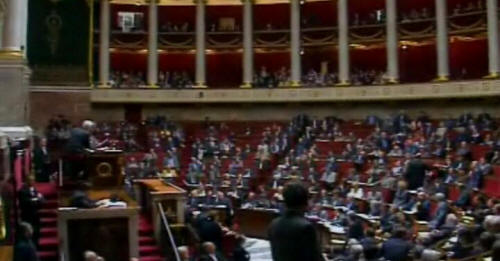
|
Capitulo XVII: La ilusión del voto y la democracia parlamentaria
“Votar es abdicar.”
Élisée Reclus
No obstante, los esclavos modernos se sienten todavía ciudadanos. Creen
votar y decidir libremente quién conducirá sus asuntos, como si aún pudieran
elegir.
Pero, cuando se trata de escoger la sociedad en la que queremos
vivir, ¿creen ustedes que existe una diferencia fundamental, entre la
socialdemocracia y la derecha populista en Francia, entre demócratas y
republicanos en Estados Unidos y entre laboristas y conservadores en el
Reino Unido?
No existe ninguna oposición, puesto que los partidos políticos
dominantes están de acuerdo en lo esencial: la conservación de la presente
sociedad mercantil. Ninguno de los partidos políticos que pueden acceder al
poder pone en entre dicho el dogma del mercado.
Y son esos mismos partidos
los que, con la complicidad mediática, acaparan las pantallas; riñen por
pequeños detalles con la esperanza de que todo siga igual; se disputan por
saber quién ocupara los puestos que les ofrece el parlamentarismo mercantil.
Esas pobres querellas son difundidas por todos los medios de comunicación
con el fin de ocultar un verdadero debate sobre la elección de la sociedad
en la que queremos vivir. La apariencia y la futilidad dominan sobre el
profundo enfrentamiento de ideas. Todo esto no se parece en nada, ni de
lejos, a una democracia.
La democracia verdadera se define en primer lugar y ante todo por la
participación masiva de los ciudadanos en la gestión de los asuntos de la
ciudad. Es directa y participativa. Encuentra su expresión más autentica en
la asamblea popular y en el dialogo permanente sobre la organización de la
vida en común.
La forma representativa y parlamentaria que usurpa el nombre
de democracia limita el poder de los ciudadanos al simple derecho de votar;
es decir, a nada. Escoger entre gris claro y gris oscuro no es una elección
verdadera. Las sillas parlamentarias son ocupadas en su inmensa mayoría por
la clase económicamente dominante, ya sea de derecha o de la pretendía
izquierda social demócrata.
No hay que conquistar el poder, hay que destruirlo. Es tiránico por
naturaleza, sea ejercido por un rey, un dictador o un presidente electo. La
única diferencia en el caso de la “democracia” parlamentaria es que los
esclavos tienen la ilusión de elegir ellos mismos al amo que deberán servir.
El voto los ha hecho cómplices de la tiranía que los oprime.
Ellos no son
esclavos porque existen amos, sino que los amos existen porque ellos han
elegido mantenerse esclavos. |
|
Chapter XVII: The illusion of voting and parliamentarian democracy
“To vote is to abdicate”
Elysées Reclus
Despite his bonds the modern slave is convinced of his citizenship. The
illusion of choice and free determination is fueled by the ability to vote
and freely elect those who will conduct his affairs.
When it comes down to
deciding the society we want to live in, is there really any fundamental
difference between the Social Democrats and the Populist Right in France,
between Democrats and Republicans in the United States, between Labor and
Conservatives in the United Kingdom?
There is no
opposition, because the
main political parties agree on one essential thing: the conservation of the
present mercantile society. None of the political parties that enter into
power question the commodities dogma. And those political parties with media
complicity monopolize the airwaves.
They squabble about trite matters
ensuring the status quo. They fight over who will hold the seats that the
mercantile parliamentary offers.
Those petty disputes are disseminated by
the media as a distraction from the critical debate about the election of
the society we want to live in. Appearance and triviality eclipse the
confrontation of ideas. None of this resembles, not even from afar, a
democracy.
Real democracy is defined, firstly, by the mass participation of citizens in
the governance of community affairs. It is direct and participative. The
popular assembly and the permanent dialogue about the organization of a
common life are Democracy’s most authentic expressions.
Representative and
parliamentarian forms of government usurp the name of democracy, limiting
the power of citizens to the simple act of voting, that is, to nothing.
Deciding between light grey and dark grey is not a real election.
Parliamentarian’s seats are mainly occupied by the dominant economic class,
be it the right or the pseudo leftist social democrats.
Power is not to be conquered, it is to be destroyed. It is tyrannical by
nature, whether exercised by a king, a dictator or an elected president. The
only difference with the parliamentarian “democracy” is that the modern
slave has the illusion of choosing the master he will obey. The vote has
made him an accomplice to the tyranny that oppresses him.
They are not slaves
because masters exist; masters exist because they elected to remain a slaves. |
|

|
Capitulo XVIII: El sistema mercantil totalitario
“La naturaleza no creó amos ni esclavos, yo no quiero dar ni recibir leyes.”
Denis Diderot
El sistema dominante se define entonces por la omnipresencia de su ideología
mercantil. Ocupa a la vez todos los espacios y todos los sectores de la vida.
No profesa más que: produce, vende, consume, acumula. Ha reducido todas las
relaciones humanas a unas parcas relaciones mercantiles, y considera que
nuestro planeta es una simple mercancía.
La función que nos asigna es el
trabajo servil. El único derecho que reconoce es el derecho a la propiedad
privada. Al único dios que rinde culto es al dinero.
El monopolio de la apariencia es total. Solo aparecen los hombres y los
discursos favorables a la ideología dominante. La crítica de este mundo se
ahoga en el mar mediático que determina qué está bien y qué está mal, lo que
se puede y lo que no se puede ver.
Omnipresencia de la ideología, culto al dinero, monopolio de la apariencia,
partido único disfrazado de pluralismo parlamentario, ausencia de una
oposición visible, represión en todas sus formas, voluntad de transformar al
hombre y al mundo:
He ahí la verdadera cara del totalitarismo moderno que
ellos llaman “democracia liberal”, pero que es hora de llamar por su
verdadero nombre: el sistema mercantil totalitario.
El hombre, la sociedad y todo nuestro planeta están al servicio de esta
ideología. El sistema mercantil totalitario ha logrado lo que ningún otro
totalitarismo había podido: ocupar cada resquicio del planeta.
Hoy en día,
ninguna forma de exilio es posible. |
|
Chapter XVIII: The Totalitarian Mercantile System
“Nature did not create masters nor slaves, I do not want to give nor receive
laws”
Denis Diderot
The dominant system is defined thus by the omnipresence of its mercantile
ideology. It occupies every space and every sector of life. It calls us to
“produce, sell, consume, and accumulate”.
The dominant system has reduced
all human interaction to dry mercantile relationships and considers our
planet a mere commodity. Our duty is to be servile. The only recognized
right is the right to private property. The only god it worships is money.
The right to appear is monopolized by those in power. The stage is reserved
for the men and speeches that uphold the dominant ideology. Critical
thinking is drowned out in a sea of media that determine what is right and
what is wrong, what can and cannot be seen.
The omnipresence of ideology, the worship of money, the media’s bias, the
absence of democratic pluralism, the lack of a visible opposition, the will
to transform mankind and all the world in its image, and repression in all
its forms.
Behold the true face of modern totalitarianism. The majority
calls it “liberal democracy”, it is time to call it what it truly is: a
totalitarian mercantile system.
Mankind, society and the entire planet serve this ideology. The totalitarian
mercantile system has achieved what no other totalitarian systems could:
hegemony over the world through its ideology.
Today, exile is impossible. |
|
|
Capitulo XIX: Perspectivas
A medida que la opresión se expande por todos los sectores de la vida, la
rebelión toma el aspecto de una guerra social. Los motines renacen y
anuncian que la revolución está por llegar.
La destrucción de la sociedad mercantil totalitaria no es un asunto de
opinión, es una necesidad absoluta en un mundo que se sabe condenado. Ya que
el poder está en todas partes, es por todas partes y por todo el tiempo que
hay que combatirlo.
La reinvención del lenguaje, el trastorno permanente de la vida cotidiana,
la desobediencia y la resistencia son las palabras claves de la rebelión
contra el orden establecido. Pero para que de esta rebelión surja una
revolución hay que encaminar las subjetividades a un frente común.
Es en la unidad de todas las fuerzas revolucionarias que hay que obrar. Esta
no se puede conseguir más que siendo conscientes de nuestros fracasos
pasados: ni el reformismo estéril ni la burocracia totalitaria pueden ser
una solución para nuestra inconformidad. Se trata de inventar nuevas formas
de organización y de lucha.
La autogestión en las empresas y la democracia directa a escala comunal
constituyen las bases de esta nueva organización que debe ser anti-jerárquica,
tanto en la forma como en el contenido.
Al poder no hay que conquistarlo, hay que destruirlo. |
|
Chapter XIX: Prospects
As oppression expands to every sector of life, rebellion takes on the form
of a social war. Riots flourish again and herald the coming of a revolution.
The destruction of the totalitarian mercantile society is not a matter of
choice, it is an absolute necessity. Given powers breadth and reach, it must
be everywhere and always contested.
The reinvention of language, the permanent revolution in everyday life,
disobedience and resistance, are the key elements of the rebellion against
the established order. But in order to make a revolution out of this
rebellion, we have to gather all these individual resistances in a united
front.
We must work to unify all the revolutionary forces. This can be attained by
remaining conscious of our past failures. Neither sterile reformism nor
totalitarian bureaucracy can be the solutions of our dissatisfaction. It
comes down to inventing new forms of organization and struggle.
Self-management for workers and direct democracy on a communal level are the
foundations of this new organization, which must be anti-hierarchical in
form as well as in content.
Power is not to be conquered, it is to be destroyed. |
|
|
Capitulo XX: Epílogo
“Caballeros, el tiempo de la vida es muy corto…
Si vivimos, vivimos para hollar cabezas de reyes.”
William Shakespeare
|
|
Chapter XX: Epilogue
“O gentlemen, the time of life is short! (…)
An if we live, we live to tread on kings”
William Shakespeare
King Henry IV
|
|


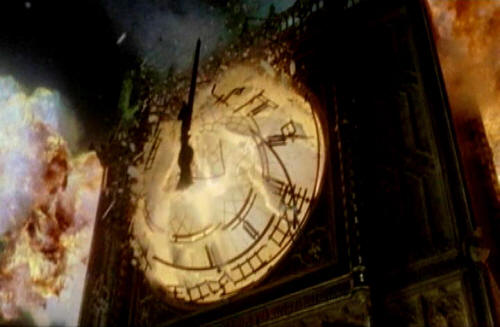
|